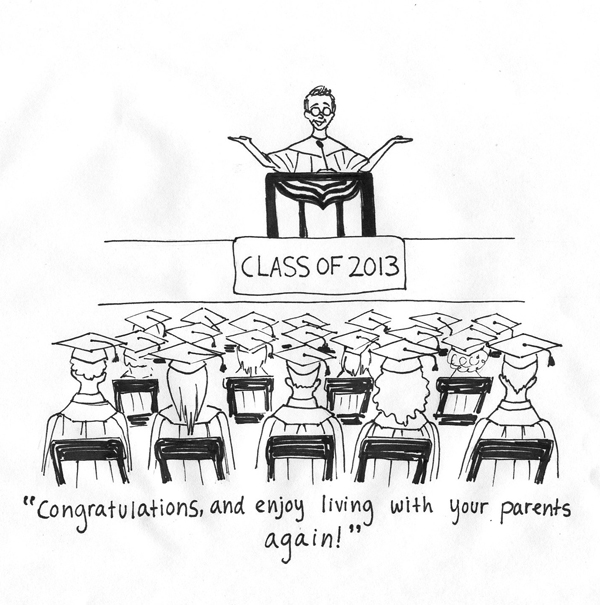More years ago than I care to admit, I sat and listened to a fairly well-known TV actor give an inspiring college graduation speech about life stories and working in the creative arts.
Here is what I wish he would have said.
It’s entirely possible you will find yourself several years out of college unemployed. Even if you are employed, it may not be the job you wanted or thought you would have. It may seem beneath you or it may be outside your field of interest. No matter what the situation, focus on developing skills that are transferable across content areas. This will certainly help you market yourself should you wish to switch fields. But even if you stay in the same field, given how fast things change these days and how interconnected most sectors have become, transferable skills count immeasurably.
That being said, specialize. Find a topic, region/market or topic within a region/market that you can and want to become expert in. And pursue it above all else. With the internet, everyone knows a little about lots of things.
Or, to paraphrase a well-known maxim, “When everybody knows something, nobody knows anything.” Think of this specialty as a river carrying you forward, and do take opportunities to explore smaller tributaries if they feed back into your overall flow.
That being said, don’t follow others into specialties. When I was in college, studying Arabic seemed like what everyone did. Today, it’s Chinese.
You will have to spend many hours a day, many days a year, focusing on a small sliver of the universe, so make sure it’s something you want for yourself, not something everyone else is doing.
Take what you learned in college and use it, but realize that expectations are different. In college, you (ideally) learn to read critically and write clearly. Somewhere in there, creative thinking also occurs. And this experience is extremely important in succeeding in the “real world.”
But unlike in academia, you will rarely have days or weeks to read a substantive text, and to write about it.
You will be expected to read something quickly and craft a response. This gets easier with experience.
Related to this, while clear and concise long-form writing is appreciated, because you’re young, people will expect you to be able to communicate on social media. The rules for this won’t be found in Strunk and White’s classic, “The Elements of Style.” Because of the more informal nature of writing on social media, utilize discretion when in doubt. Remember, the reach of the medium is immense: with 140 characters you could reach more people than a book of 300 pages ever could.
That being said, there is one area in which your writing skills will be tested and needed – raising money.
Whether you work in the private or non-profit sector, raising capital requires more than tweets and blog posts. You will be expected to craft arguments (“why should I invest in your idea?”) and to do so clearly and cogently. There is no substitute.
That being said, no matter how impressive your writing or your overall resume is, and how much you want the world to function based on merit, sometimes it simply does not. You could do your very best, but not succeed. People get ahead in all kinds of ways: connections, reputation, sheer luck.
If that’s the case, play the game. When you are a global leader one day, you can implement a meritocratic system that rewards hard work.
But for now, utilize the networks of friends – and fellow Emory grads. If, in a few years, an Emory class of 2020 graduate comes to you for job advice, of course you’ll give it. Emory is more than a brand name, it’s a community.
And yet, brands are powerful. Wherever you go, people will associate you as a product of Emory. This can be a blessing, because Emory is a world-class academic institution, and association with it could open doors. But it’s also your responsibility.
Your work, whether you like it or not, may impact how others view Emory alums. Of course, you bring your own individuality to your work, and you can’t be defined solely by where you went to school, but in your 20s, when you have limited work experience, your Alma Mater counts for a lot.
And finally, take advice from anyone willing to share it with you, but adapt it to your own unique circumstances and proclivities. There’s a path that lies between blindly following the advice of others, and stubbornly following one’s own beliefs. The path is not well lit, though.
And though the forks in the road are not nearly as discrete as one imagined as a child, the path generally curves, so be ready with a compass.
Jason Schulman is a graduate student in the History Department.
Cartoon by Priyanka Pai
The Emory Wheel was founded in 1919 and is currently the only independent, student-run newspaper of Emory University. The Wheel publishes weekly on Wednesdays during the academic year, except during University holidays and scheduled publication intermissions.
The Wheel is financially and editorially independent from the University. All of its content is generated by the Wheel’s more than 100 student staff members and contributing writers, and its printing costs are covered by profits from self-generated advertising sales.






I think it’s better not to provide social security quantity.Do they called you ans ID?